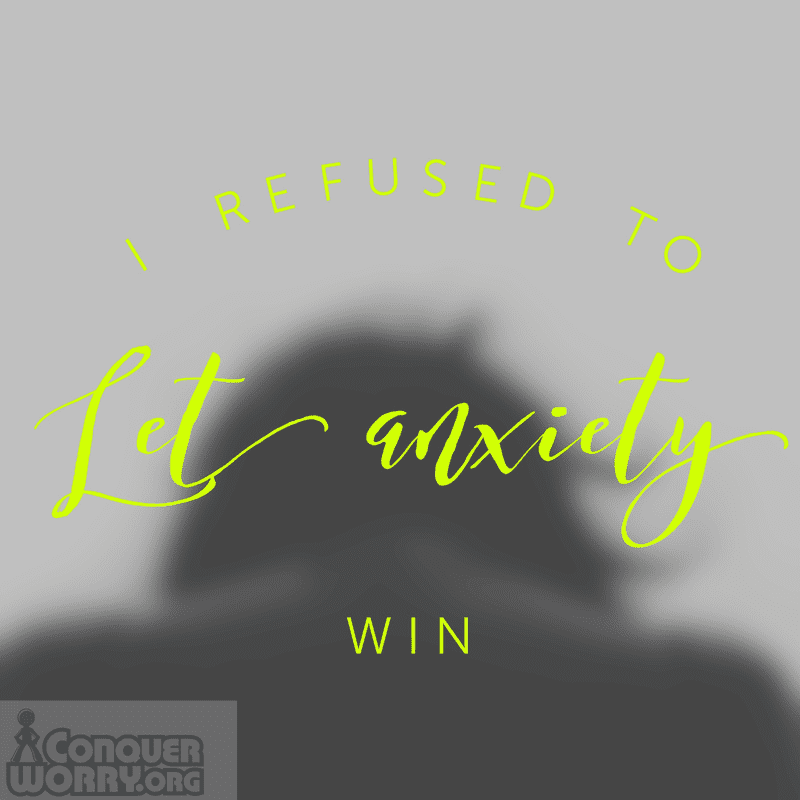|
As a little girl, I was a worrier. I worried about silly things like spiders in my bed, aliens living next door, whether my friends liked me, and what to wear to school. As I grew, so did my worries. Boyfriends and jobs, teachers and classes, filled my thoughts, the normal concerns of any young girl. But there were other worries that consumed me, like a brother who ran away, and another who clung to me when parents fought. I worried about our parents, and whether their worries would tear them apart. I worried myself into teenage anorexia, which became my coping mechanism for dealing with stress. As a teen, I was expected to fit in, eat with my friends, and munch on snacks all day long, which made me eventually give up anorexia, and worry about my weight. Every time I thought about my weight, I exercised, twirled my hair, fidgeted in my chair, and clicked my fingers, my new ways of dealing with anxiety. Photo by mojzagrebinfo via Pixabay I worried so much, I was often sick, sometimes for a month at a time. I missed school, and wondered if I’d get my work done, or even pass my grade. I worried about the flu and colds I often developed, unexplained fevers, and sores that covered the inside of my mouth. By adulthood, I was a flustered, stressed-out, overthinking mess. Only by now, I was getting better at hiding my worries. I hid them behind too much work and fussing constantly in my home. I disguised my worries in sleepless nights. No one, not my children, parents, or husband, knew the constant brooding in my head. I guess you could say, in some strange way, I had control over my worries. Only I didn’t. A few years ago, they all came tumbling out. As my husband and I sat in our car, waiting to turn into a tiny fruit stand, another vehicle rammed into us. I don’t remember the crush of metal against metal, or my brain being flung from one side of my skull to another. What I do remember is standing on the side of the road after the accident, and panicking. Heart-thumping, body-shaking, sweat-dripping, panic. In one brief second, the only control I’d ever had over my worries, was gone, and there was nothing I could do. And to this day, I still have problems controlling my panic. Photo by Alexas_Fotos via Pixabay Recently, a string of events, some unforeseen, some planned, sent me over the proverbial edge. In less than two months, three sets of guests stayed overnight, my husband lost one job and gained another, we went on an out-of-state trip, I was called to jury duty, and I experienced a health scare. To top it off, my children were experiencing their own sets of problems, and though they are adults, I still worried. I worried about everyone those few months: My guests, whether they were happy, comfortable, and having fun; my husband, his old job, his new job, his salary, his benefits. I worried about my children, and their futures. I even found time to worry about a brother who was moving away. It wasn’t unusual for me to worry, but now, my worries were different. I no longer knew how to control them. I no longer knew how to hide behind daily activities. Those two months were filled with a shaking body, constant tears, and a temper that flared for no reason. When it was over, I’d fall in bed, confused, and exhausted beyond belief. Other things had changed in me as well. Worry wasn’t just a part of my life, it consumed me. So much, I’d forget to eat, nap, and exercise. In other words, I’d forget about me. It wasn’t until I received the envelope from the courthouse that I began to figure it out. I knew what it was before I opened it. With shaking hands, I read the neatly printed words on the page, and began to cry. “What is it?” asked my husband. “I have jury duty.” Thoughts raced through my mind. How could I sit in a stuffy courtroom, next to people I didn’t know? What if I didn’t understand what was being said? What if I got tired or needed to eat? Instead of thinking it through, I worried about every scenario. “I can’t do it,” I cried. My husband took me in his arms. “You were called to jury duty a few years ago,” he said. “Your doctor wrote a letter. Call her tomorrow. I’m sure she’ll write another one.” She did. But until I had that final notice in my hand, the one that said I wasn’t required to show up for jury duty, I was a freaked-out, stressed, worried mess. Unfortunately, I had one more thing to worry about. The next week, I received a call from a medical specialist I had recently seen. “We found something on your tests. You need a biopsy,” she said. I hung up the phone, and began to sob. I cried until every muscle ached and my mind reeled with tons of thoughts and emotions. I was convinced life was over, that I’d never celebrate another Christmas, never see another birthday. I was saddened by a family I’d lose, one that I’d no longer be there for, one I wouldn’t see grow and change. By the time I went to the doctor, I was falling apart. Every crease in my face accentuated, every muscle tensed, every word shook as I spoke. A nurse was brought in to hold my hand during my biopsy. As I look back now, I am truly embarrassed by the way I acted. It’s true, it was a stressful time. It would have been stressful for anyone. But I wonder if others would have reacted the way I did. I’ve tried to gain control of my emotions, my worries, my life, but I’m not certain I can. It is a part of who I am, a flaw I am learning to live with. But I know this, I will never quit trying. If anything good has come from my emotional traumas, it is this: My marriage is stronger, for I no longer hide behind flaws. Each flaw is beautifully displayed, for my husband, and all the world, to see; I am stronger. I am learning every day to accept who I am; and most importantly, I am learning to take care of me. About the Author
0 Comments
|
Build Your Action Based Stress Reduction System
Popular PodcastsOlympian Suzy Favor Hamilton - From Fame to Prostitution to Advocacy
Hall of Fame Basketball Star Chamique Holdsclaw on Mental Resilience Diana Nightingale on her husband Earl Nightingale's Principles for Mental Health Success JoAnn Buttaro on Date Rape & PTSD Survival Story: Its Never Too Late Gabe Howard on BiPolar Advocacy Phil Fulmer on Teen Suicide Prison, Bipolar and Mania with Andy Behrman Columbia Univeristy's Dr. Rynn on OCD Archives
March 2018
Categories
All
|







 RSS Feed
RSS Feed





